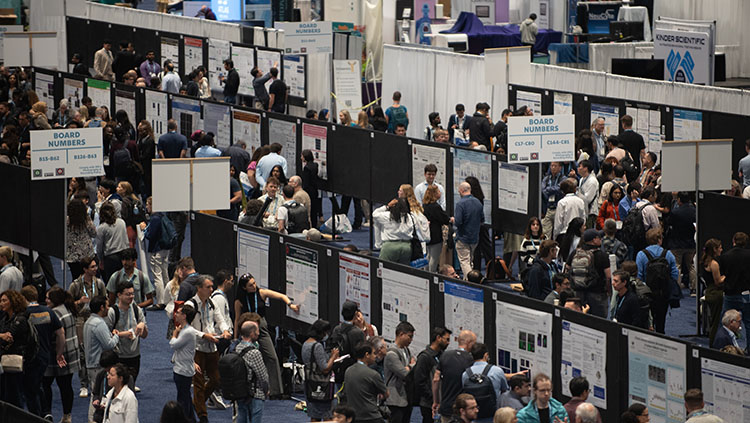SfN Membership Approves Changes to the Society’s Governing Documents
In early 2024, SfN Council appointed a Working Group on SfN Individual Membership to help review how the Society could evolve its membership program to better meet the progressing needs of the field. At its Summer 2024 meeting, Council considered the recommendations of the Working Group and conducted a series of votes to change parts of SfN’s membership structure. In support of these changes, SfN’s governing documents needed to be revised. The revisions requiring approval from the membership were presented at the SfN Members’ Business Meeting at Neuroscience 2024, which were then voted on digitally and approved by the membership in December 2024.
The below summarizes the member-approved changes to SfN’s governing documents, membership categories, and more.
- Broadly, what were the results of the membership vote in December 2024?
The vote by the membership overwhelmingly approved the proposed changes to SfN’s governing documents, enabling the Society to make two foundational changes to its membership structure.
The first change is to expand who can be considered an individual member of SfN. Originally, only an individual who “has done research relating to the neurosciences” was eligible to apply for membership in SfN. Now, individuals who “have a professional or academic background related to neuroscience” are eligible to be members of the Society.
Now, individuals who “have a professional or academic background related to neuroscience” are eligible to be members of the Society.
Before this change, individuals no longer doing research — or perhaps never having done research — but still associated with the field (e.g., careers in publishing, regulation) were offered “affiliate” membership with SfN. Affiliate members faced several restrictions as they could not vote in SfN elections, could not submit an abstract to SfN’s annual meeting, and other limitations.
Because the new, expanded definition of a full voting member is meant to be more inclusive of the neuroscience community, especially as the field evolves, the affiliate membership category is no longer needed and has been eliminated. Past affiliate members are now welcome as regular members.
The second change is to formalize the broadening of what can be considered for membership with the Society. The original definition of an SfN member was limited to individuals. Now, organizations like sustaining associate members (SAMs) and institutional program (IP) members are codified in SfN’s Bylaws as membership categories.
- What are SfN’s governing documents — Articles of Incorporation, Bylaws, and Resolutions to the Bylaws — and what are they for? How are these changes made?
- The Articles of Incorporation establish SfN as an organization and provide a broad framework for the Society. It is a legal document required for the organization to exist and be recognized by state and federal laws.
- SfN’s Bylaws, as required by the Articles of Incorporation and local District of Columbia law, provide foundational principles and rules in the governance and operations of the Society. Procedures related to SfN’s governance, leadership roles, memberships, meetings, voting, and other aspects of the Society are outlined here.
- In conjunction with the Bylaws, SfN has the Resolutions to the Bylaws which contain formal decisions made by the organization’s designated Board of Directors (i.e., SfN Council) to build and expand upon the existing bylaws to facilitate ongoing decision-making and operations.
Proposed amendments to the Articles of Incorporation and revisions to the Bylaws must be voted on and approved by a majority of voting members. Resolutions to the Bylaws are approved by Council.
- SfN’s governing documents have been unchanged since 2008. Why change them now?
Council recognized the need to make changes to the membership structure. Because membership is defined in the Society’s Bylaws, Council’s desired changes required a vote by the full membership. Since such a vote is a large undertaking, other changes to SfN’s Bylaws were included to reflect current best operating practices of a professional society (see question 6). As the Society continues to evolve, the Bylaws and Articles of Incorporation may need to be amended occasionally to support the changing neuroscience field.
- How is membership changing in the Articles of Incorporation and Bylaws?
In the original Articles of Incorporation, Article 5 presented three classes of members: regular, affiliate, and student members, with only regular members having the right to vote in membership elections. The member-approved changes formally moved all membership matters and how they should be handled to the Bylaws.
With all membership matters moved from the Articles of Incorporation to the Bylaws, operational details related to membership were moved from the Bylaws to the Resolutions to the Bylaws. That said, the substance of SfN’s operations remains largely the same. These operational details offer clarifications to articles in the Bylaws and guide the Society on day-to-day procedures, such as what membership subcategories the Society offers to individuals.
These changes enable SfN and Council to be more nimble in responding to future changes in the field.
- What is happening to the current subcategories of individual membership?
The subcategories of individual membership (regular, emeritus, postdoc, graduate student, undergraduate student memberships) will now be defined in the Resolutions to the Bylaws, “Resolutions to Article III. Membership”, which gives Council more flexibility over the subcategories of individual membership. This will allow Council to respond more nimbly to the changing neuroscience community and membership needs through individual membership subcategories.
- Do emeritus and honorary members now need to pay dues?
No. Emeritus and honorary members will continue to enjoy free dues. The Dues section “Resolution 5 Reduced Dues” was moved from the Bylaws to the Resolutions to the Bylaws.
- What else is changing as a result of the membership vote?
Statements in the Bylaws about the election of councilors and officers were streamlined and consolidated to reflect current practice; elections will continue annually without any modifications.
Member category voting eligibility has been relocated from the Bylaws to the Resolutions to the Bylaws. This action, combined with Council’s earlier decision to make graduate student members eligible to vote, means that graduate student members will receive ballots starting in 2025.
Additionally, the treasurer responsibilities as outlined in the Bylaws were updated to reflect modern financial management practices of a professional society. This position will maintain an advisory role to Council on financial matters.























